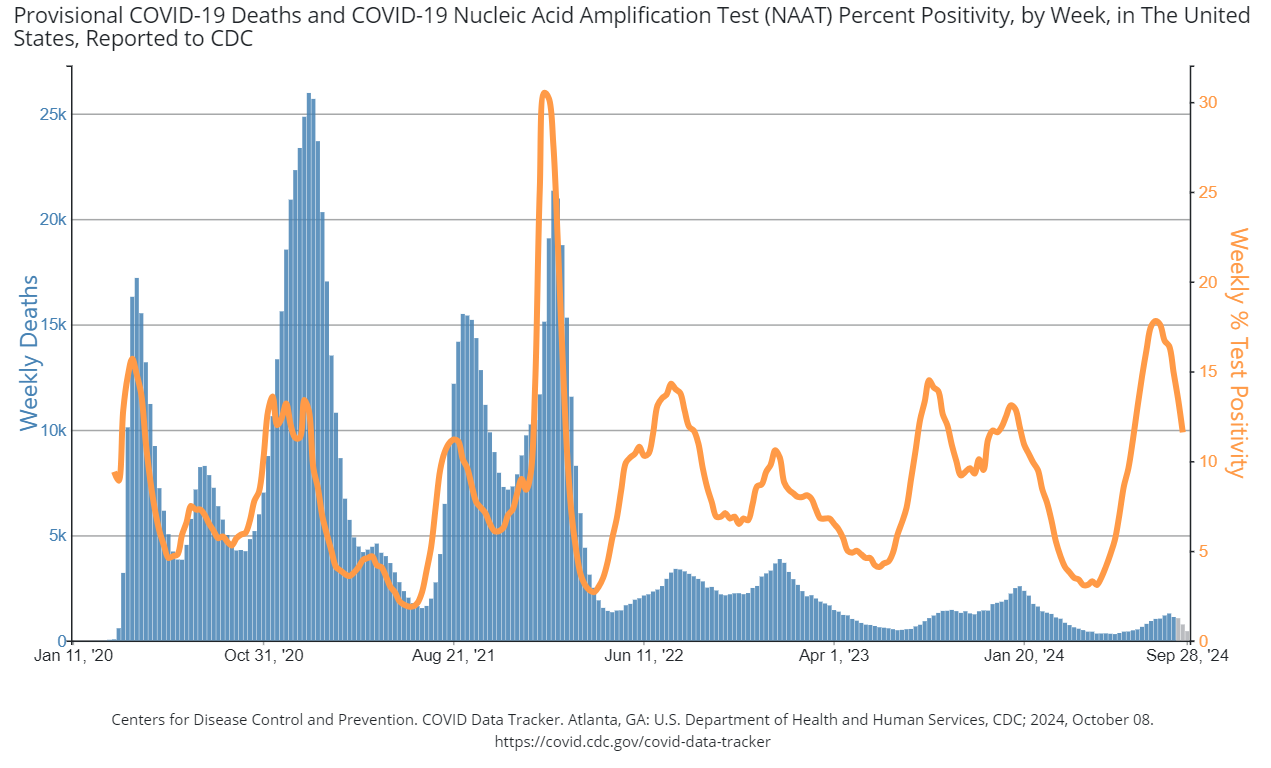We are Learning More about the Concerning Health Consequences of COVID-19 infections
As much as many of us would love to forget ever hearing about the Coronavirus, the reality is that COVID-19 infections have become an endemic disease in the US, with periodic spikes recurring – especially during the summer months.

The virus continues to evolve as well, with new, even more contagious subvariants emerging – including the so-called FLiRT variants (such as KP.2 and KP.3) that descended from the Omicron variant – as well as a newer one called LB.1.
We are also getting a better understanding of the long-term health complications that come with a Covid-19 infection.
As you may recall, one of the symptoms affecting some patients with Coronavirus infections was the loss of taste and/or smell; a condition found to be either limited to the time of the infection or, unfortunately for some, a long-term consequence of the disease.
Now there is concern about sudden hearing loss. A study conducted in South Korea that was recently published in the eClinicalMedicine (a Lancet publication) found that a small percentage of young adults with a history of Covid infection could suffer gradual hearing loss (HL) or sudden sensorineural hearing loss (SSNHL) – defined as a significant hearing loss within three days.
According to a new paper in Nature, other significant health conditions may be associated with even a “mild” COVID-19 infection, which can present up to three years after the initial infection.
These include problems with the GI tract (including irritable bowel syndrome), mini-strokes, and scarring of the lungs.

Debilitating “Long Covid” is now a Major Public Health Concern
The consequences of a Covid infection are even greater among the estimated 400 million Covid patients worldwide who have been diagnosed with “Long Covid” (formally known as Postacute sequelae of SARS-CoV-2 infection or PASC). This is a serious bout of the disease that can last weeks, months, or even years.
Patients with Long Covid (thought to affect about 6% of all adults with Covid and 1% of pediatric patients) experience one or more lingering symptoms, including loss of smell, taste, insomnia, cognitive dysfunction, or memory loss.
Investigators have also found that some Long Covid patients experienced damage to several vital organ systems, from the heart (myocarditis, palpitations, and elevated heart rates), to the lungs (scarring, difficulty breathing), neurological (brain fog, seizures, strokes, as well as evidence of Guillain-Barre syndrome), as well as post-exertional malaise (onset of extreme fatigue, especially after even minor physical activity.)
While researchers and healthcare providers have been able to identify serious symptoms afflicting Long Covid patients, creating a diagnostic test to differentiate those with Long Covid is proving difficult. In an article published in the Annals of Internal Medicine (doi 10.7326/M24-0737), researchers were not able to reliably diagnose Long Covid using 25 standard clinical laboratory tests.
The solution may be to look at unusual imbalances in the immune system and hormones of Long Covid patients. Researchers at the Department of Immunobiology, Yale School of Medicine, published an article in Nature (doi 10.1038/s41586-023-06651-y) outlining the use of machine learning techniques to identify unique immune systems responses (such as elevated response to Epstein–Barr virus) as well as distinct hormonal responses (such as lowered cortisol levels) among Long Covid patients. Hopefully, these research insights can lead to the development of much-needed definitive clinical tests in the near future.

New Insights into Why Some People Seem to Avoid Covid Infections Altogether
The effect of Long Covid is devastating to individual patients (and their families).
It also presents a serious economic cost to the economy, affecting an estimated 1 million American workers, many of whom are now only able to work part-time, if at all.
Fortunately, however, not everyone who is exposed to Covid becomes infected with the virus.
The question is why?
Who are these lucky individuals, and what is the reason for their good fortune?
To get a better understanding of this, researchers at the University College London, the Wellcome Sanger Institute, and the Imperial College London conducted a study with 16 healthy unvaccinated individuals who had no prior history of Covid exposure (doi 10.1038/s41591-022-01780-9).
After exposing the volunteers to low levels of the Covid virus, researchers were able to categorize the volunteers into three groups: those who came down with Covid (Sustained Infection), those who were infected but only presented one positive Covid test (Transient Infection) and those who appeared not to get infected at all (Abortive Infection).
Subsequent research revealed that volunteers in the “Abortive Infection” group had higher expressed levels of a specific gene (called HLA-DQA2) than those who either came down with COVID-19 or had a brief transient infection.
Hopefully, this important new insight will lead to new clinical treatments to prevent COVID-19 infections from taking hold in the first place.

Updated mRNA-Based Covid Vaccines are Now Available
In the meantime, the FDA recently authorized new, updated mRNA vaccines that target the latest FLiRT variant KP.2 and its predecessor JN.1.
According to the CDC, Covid vaccines can help reduce the risk of developing Long Covid by 50%.
The CDC recommends getting vaccinated with newest COVID-19 vaccines that were approved by the FDA in August 2024. Studies indicate that vaccinations can reduce the risk of developing Long Covid by 50%.

Friendly Reminder: mRNA Covid Vaccines Don’t Prevent Acquiring a Covid Infection in the Nasal Passages
While mRNA Covid vaccines can help reduce the risk of serious disease, they aren’t ideal for preventing one of the most common methods of viral transmission – through the nasal passages.
Researchers have been developing alternative vaccine approaches that seek to overcome this shortcoming.
One of the most recent developments is a new animal study from the University of Houston (doi 10.1038/s41467-024-50234-y) that reportedly demonstrates the efficacy of a nasal spray, called NanoSTING, that uses nanoparticles to deliver an antiviral dose said to be effective against both influenza and Covid infections.
In the meantime, remember that washing your hands and wearing an N-95 mask if you are vulnerable (or suspect you may have been exposed to COVID) remain important tools to prevent the spread of the disease.
Finally, reducing your co-morbidities may help prevent serious Covid disease.
Researchers publishing in the Journal of the American College of Cardiology (doi 10.1016/j.jacc.2024.08.035) report that patients taking the drug Semaglutide (the active ingredient in Wegovy and Ozempic) had a significantly lower risk (33%) of dying from Covid that those not on the medication. Presumably, this is thanks to weight loss and enhanced control over Type-2 diabetes among patients in the study, both of which are known co-morbidities that can raise the risk of COVID-19 infections.

Formaspace is Your Laboratory Research Partner
Evolving Workspaces. It’s in our DNA.
Talk to your Formaspace Sales Representative or Strategic Dealer Partner today to learn more about how we can work together to make your next construction project or remodel a success.













